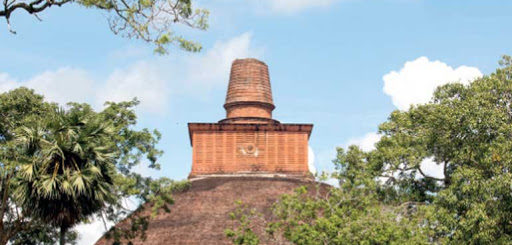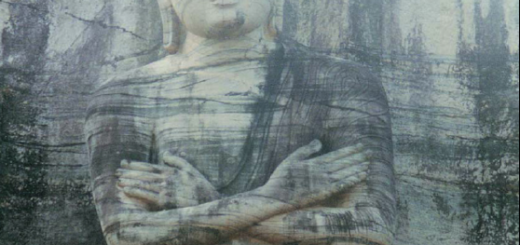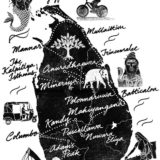Ranil = Run Nil
Right now Ranil Wickremesinghe, the ex-Prime Minister holding the exceptional record of being sacked twice by the presidency, is in a dilemma: he does not know whether to leave or not to leave “Temple Trees,” the official residence of the prime minister. The first time he was sacked by the presidency was when he was sitting in the White House. When he walked out into the lawn to meet the press he looked like a stunned tourist lost without a road map. This time he was in Galle and rushed back to Colombo wondering what smart moves he could make to regain the paradise of power he lost.
The best he has done so far is to cling on to the symbol of office which is the official residence of the prime minister – now a lonely place without the accoutrements of power. He obviously believes that if he announces that he is still at “Temple Trees” the people will accept him as the prime minister. But the instruments of power have been removed. Even his private secretary has been removed by a Gazette Notification. President Maithripala Sirisena displayed his power by swearing in Mahinda Rajapakse with all heads of Security Forces standing ceremonially behind him. What is more, the pro-Ranil IGP, Pujitha Jayasundara, was summoned to the residence of Rajapakse to make him acknowledge the supremacy of his new master.
So what’s the point of Ranil sitting in a political wheel chair at “Temple Trees” hoping to be trundled into power again by someone in the Western embassies who rushed to meet him there? The intervening international power play in this local drama is intriguing. While the Western dip-low-mutts made their presence felt at “Temple Trees”, indicating that they were on his side, the Chinese Ambassador, Cheng Xueyuan , accompanied by his diplomatic entourage, brought the greetings of the Chinese President, Xi-Ji Ping and delivered it personally to Mahinda Rajapakse at his residence.
This diplomatic line-up indicates that what happened on Friday night was just not a low-grade street drama in which a papier mache political puppet lost his head. It revealed the potential international dimensions of the removal of a key agent of the West located in a strategic centre of the Indian Ocean. Ranil is their reliable partner who can be called upon any time to play his obedient role in defending Western interests in the Indian Ocean Region. The Chinese, on the other hand, know that Mahinda Rajapakse is their ally who can balance Sri Lanka’s national interests with that of China’s string of pearls. This was confirmed by Ranil in his address to the Oxford Union. He gallantly defended Mahinda Rajapakse’s agreement with China saying that Hambantota was not a base sold out to China. He said it was only a commercial venture run jointly with a Chinese company.
That apart, the question facing Ranil is almost Hamletian: to be or not to be at “Temple Trees”. His staying at “Temple Trees” is not going to prove anything. His real seat of power is in Parliament. He says that he has the majority in the House. Well, if so he can come back to “Temple Trees” if and when he proves it. So why hang on to a powerless chair at “Temple Trees”? Why not go out gracefully without being dragged out ignominiously?
He must have seen on TV what happened to his aggressive ministers who tucked up their political sarongs and ran to capture power at Rupavahini TV station on the night of the sacking. Both Mangala Samaraweera and Ranil’s boyish pet, Sagala Ratnayake, gate-crashed into Rupavahini premises hoping to commandeer the mike and make national broadcasts about the legality of the sacking of Ranil. The angry staff chased them out and they had to retreat, along with Chatura Senaratna, son on Rajitha Senaratna, humiliated by hoots, cat-calls and obscenities. That unruly scenario aired on TV was a sure sign of power slipping out of their leader Ranil sitting near the shore of the Indian Ocean and ordering the waves to stop rolling.
Fortunately, the wrath of the aggrieved people did not explode into violence. But today the UNPers are planning to bus their “catchers” to “Temple Trees”, hoping to put up a rival show of mass support to keep Ranil in the official residence. So far the contest of the political rivals has not spilled over to the streets. Will today’s act be the start of a needless confrontation that can mar the image of Sri Lanka achieving the No: 1 status as a tourist destination? Does the nation have to sacrifice its promising tourist trade and stability to protect Ranil’s wobbly chair at “Temple Trees”? Figures like Ranil can be cut out of cardboards any time. But the No:1 ranking is not attainable in a hurry. Ranil should do the sensible thing and go home because, if he is that sure of a majority in the House, he can always come back.
Ranil, of course, has been the master of farcical political drama. His career spans the most critical phase of the post-independent era. And each time he managed to worm his way into the premier’s seat he has left it in a state worse than the time he stepped into it. His greatest claim to fame is that he has been the prime minister four times. But he has now established a new record: the only prime minister to be sacked twice. Which is greater : creeping into the premier’s chair through the backdoor or getting thrown out through the front door?
The backdoor? All four times he became the premier he was not elected with the full consent of the people. The highest number of seats he got was 109 in 2009. He never could cross the winning line and capture the critical 113 seats needed to be the Prime Minister in his own right. In fact, an overall survey of the political landscape will confirm that it was the LTTE that paved the path for him to be PM. If the three iconic leaders of the UNP – Premadasa, Lalith and Gamini – were not assassinated by the LTTE Ranil would never have been considered by the Party as having leadership qualities or the prime ministerial material in him to lead the nation.
Consider, for instance, the first time he became prime minister. It happened in a political vacuum. Two of three key icons in the UNP were assassinated, one after the other, by the LTTE. The first victim was Lalith Athulathmudali who was assassinated by the LTTE at Kirulapone. Shortly after that President Ranasinghe Premadasa was assassinated. Gamini Dissanayake, the third icon, was out of the party, having broken away from President Premadasa.
This was the turning point in Ranil’s career. President D. B. Wijetunga offered the post of premiership to Sirisena Cooray, the General Secretary of the Party. Sirisena was reluctant to take the job. I remember K. N. Choksy, the principal legal advisor to President Premadasa, Sunil Rodrigo, Chairman of Lake House and the present writer meeting Sirisena one night in May 1993 and pleading with him to take the offer. He was given all the reasons why he should step into the shoes of the premier. But he refused stubbornly. He was insisting that it should be given to Ranil. That’s how Ranil became the Prime Minister the first time on May 7, 1993 – through the backdoor and not through the popular will of the people.
However, he was “sacked” by the people in the next election. In the meantime, Gamini Dissanayake, the more charismatic and affable leader, in the UNP returned to the Party. It didn’t take long for him to oust Ranil. The back- benchers were behind Gamini. Ranil was defeated in an open contest. That’s the first time Ranil was “sacked” by his own party.
The second time was when he barely scraped through the election of when Chandrika Kumaratunga was President. But he didn’t have the requisite numbers – he had only 106 — to be the Prime Minister in his own right. He had to cut a deal with the Muslim Congress to maintain his majority in the House. Another back-door deal put him in the premier’s seat. Of course, everyone knows how President Kumaratunga sacked him while he was in the White House.
Third time too he became prime minister through the back door. Yahapalanaya had won on January 8, 2015 and D. M. Jayaratne was the Prime Minister with around 150 MPs backing him. Ranil had only 47 MPs but he insisted on being made the Prime Minister. Issues of constitutionality didn’t bother him one bit. Nor did the NGOs and the Western dip-low-mutts raise any objections. Anyway when he went to the polls he failed again to win a clear majority. He had to be propped up by other allied parties. The man who came with a bang in 2015 is now fading with a whimper in 2018. All his manipulative gimmicks of strengthening his prime ministerial seat with constitutional deconstruction have failed to secure his seat. He brought in the 19th Amendment to acquire the powers of the presidency and secure his prime ministerial without being kicked out. He now finds that the Presidency is still more powerful than his seat at “Temple Trees”. That, in short, is the story of Ranil Wickremesinghe: all his clever tactics (examples: peace deal with Prabhakaran or the 19th Amendment) have ricocheted with invigorated power to knock him down.
However, the battle is not yet over. He has still some life left in him. If the money that bonds the MPs works in his favour he might still return to “Temple Trees”. But he must be aware, in his own dim way that the future is not with him. Even if he wins the vote in Parliament when it meets on November 16 he will come out of it limping like a lame duck. The final victory that counts is not in Parliament but in the electorate.
If the numbers in the last local government elections are a reliable indicator then what do the tea leaves tell about his future? The nation is also entitled to ask : What has he achieved by assuming the leadership of the great party founded by the revered Father of the Nation, D. S. Senanayake? Can he point to one memorable or lasting achievement in his career that would be remembered in history? Isn’t he going to end up his career as the unpardonable and heinous swindler of the nation’s wealth at the highest level? All indicators reveal that his future is as great as that of his trusted partner in peace: Velupillai Prabhakaran. In Ranil’s case, however, it will be a political death. He will leave nothing behind as his legacy except the shameful ruins of his failed policies that never served his party, the nation or even his own self.









